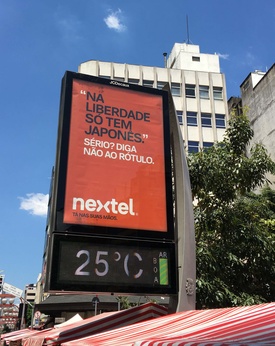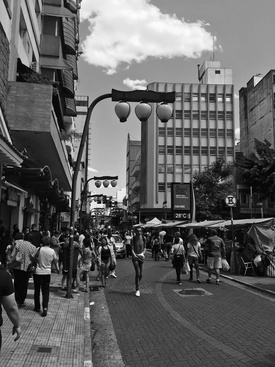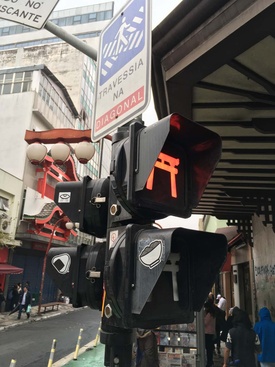
When I began my studies on tattoo artists of Japanese descent in Brazil, in my master's research in Anthropology at the Federal University of São Carlos (UFSCar), I had some idea of what lay ahead. It is very complicated to read texts, articles, theories about a group of people – the Japanese and their descendants – of which you are also part. This was because everything evoked memories, experiences, often painful experiences, of prejudice, of racism, and no matter how sensitive these texts tried to be, at some point I would come across some formulation, some idea that caused me extreme anguish. So I thought: how can they think/say something like that? I am not like these theorists are saying I am.
To begin with, the terms used to refer to people of Japanese descent are quite problematic: it is common for us to be called Japanese , Nikkei , Japanese-Brazilians . But what do these terms really mean? Despite being literal, Nipodedescendants also seems to me to be a category devoid of meaning. Yes, we are of Japanese descent, but does that define us? Does it say about all the experiences we go through?
The feeling I had when reading these texts was that these terms took “the Japanese ”, “the Nikkei ”, “the Japanese-Brazilians ”, “the Japanese descendants ” as a closed group and homogeneous, which has in its ancestry all the answers to its experiences, as if all these experiences were the same and experienced in the same way by all people of Japanese descent. And this ends up crystallizing notions about what it means to be of Japanese descent in Brazil . But, after all, what does it mean to be of Japanese descent in Brazil ?
As a Japanese descendant , I thought I would have a much better answer than the theorists I had read. But the reality was quite different. Despite being worried about not sounding like many of these authors, I wasn't aware of a second problem: myself.
In the first foray into my field research, I went to talk to a well-known tattoo artist from São Paulo, who I will call Felipe here. Of Japanese descent from his father, Felipe learned to tattoo from his father since he was little, and specialized in the world-famous Japanese tattoo.
We talked about his grandparents coming to Brazil, about the time he spent in Japan as a decasségui , where he started tattooing professionally. We also talk about his style and tattoo techniques. But when I left his studio, after finishing the interview, the feeling that overcame me was one of extreme discomfort. I couldn't understand why.
At first, I realized that the interview didn't go as I imagined. I noticed that it was as if my interviewee was going off on tangents all the time, as if he were slipping through my fingers. This feeling of not having accomplished everything I wanted, of not having addressed all the questions in my research and, above all, of not having reached any conclusion left me with a bitter taste.
Perhaps the quickest explanation for this is the insecurity of a first-class anthropologist.
At the beginning of the interview, I realized that there was something strange happening. Obviously, I wasn't comfortable with the situation, but it wasn't just that. Something imprisoned me, glued my fists to the notebook, lowered the volume of my voice. Faced with a formal situation, I needed to format certain behaviors of mine, adapt myself to certain expectations. But what were these expectations?
I realize that, when dealing with my first informant, who was of Japanese descent, my stance was to repress certain aspects of my personality that deviated from a certain expectation that I imagined falling upon me because I was also of Japanese descent. So, during the interview, I acted with patience when having to wait for about an hour for my interviewee to arrive, with persistence and dedication in asking – to a certain extent – to explain something I didn't understand more than once, with submission by politely lowering my tone of voice when, in the middle of the interview, he had to answer the door because someone was looking for his partner. It seems to me that it is these expectations, often stereotypical, that are expected of people of Japanese descent .
They shape what I will call the “box” here. Within an organizational logic, we mentally classify the characteristics we expect from Japanese people, we format the box according to these expectations. Faced with certain situations, we put ourselves in the box – just like we put other people in –, we fit in, we format ourselves, all, obviously, in a neither conscious nor deliberate way.
The feeling of failed work that I mentioned seems to have its origins in this. The moment I put my interviewee in the same box as me, I expected from him the same ideas that I had about the issues raised. If this does not happen, the feeling of failure and dissatisfaction could not be different.
Another important point to highlight is the box in which I was placed by Felipe. He used expressions in Japanese all the time, talking about topics as if I had full knowledge of what he was saying. This naturally occurs with most, if not all, male and female anthropologists who have ever been in the field. However, I note that the points that, for Felipe, were shared with me did not take me into account as an anthropologist, but as a person of Japanese descent. By putting me in the same box he put himself in, Felipe assumed that much of what he said was part of my “natural” understanding.
The box in which I placed myself with Felipe plus the box in which he placed me with himself resulted in an interview that was completely cut and open, without much understanding, perhaps on both sides, because, as people supposedly belonging to the same group – the Japanese , Nikkei , Japanese-Brazilians, people of Japanese descent – we, in reality, shared very little.
When I entered the field for the first time, I took with me a baggage full of square readings that I wanted to distance myself from, but I also took with me a series of preconceptions that I carried about what it means to be of Japanese descent in Brazil , hoping that Felipe – and perhaps all people of Japanese descent – if they identified with my idea of being of Japanese descent . The reality is that, after three years of research, I realize that the ways of being, living and being in the world, of seeing, of experiencing are countless, which do not fit into any type of categorization or explanation. This is because being of Japanese descent is just a definition of what we are, and yet this definition involves infinite perspectives.
Even finding a common determinant among all people of Japanese descent is quite difficult. Many could say that blood is unquestionable for “ascertaining” a person’s ancestry. The Japanese government, however, although based on the principle of jus sanguinis – which recognizes a person's nationality according to their ancestry, does not legitimize people born outside of Japan as Japanese. We are not Japanese like the Japanese born there, we do not have the same rights, duties, opportunities. There are countless reports about the experiences of people of Japanese descent who went to work in Japan and realized, there, how Brazilian they were.

To finish, I would like to bring here an experience of mine when I discovered Bairro Liberdade, in São Paulo, for the first time. What I realized is that being in Liberdade gave me a feeling of familiarity that I was never used to. Walking through the streets of Liberdade – the double meaning seems interesting – I experienced a completely new sensation of ordinarism. It wasn't simply about being among a majority of people who physically look like me – being at a family party doesn't make me feel like one of the crowd. It was about being in a space where much of what was exposed, on display, made no sense to me, nothing there demanded (re)cognition from me, a behavior, a way of being. I looked around me and what I saw was a jumble of stores, restaurants, people completely different from anything I had ever seen. And this feeling of not knowing – and especially not needing to know – what those objects, fruits, writings meant was a relief.
The lightness I felt at that moment was what made me realize the weight I had carried until then without knowing it, because for the first time I didn't feel it on my shoulders.
I explain. It's just that I'm asked all the time – and I imagine that many of the readers here go through this – about how to eat with “chopsticks”, about the difference between shimeji and shitake , about how to write your own name in Japanese , about which fish sashimi is made, about geishas, the yakuza . There is an expectation about me, being of Japanese descent, that I dominate or should dominate all aspects of what is understood as “Japanese culture” in Brazil. These are the expectations of the “box”, which I carry back and forth in case I need to use it, and in it is a set of knowledge, techniques, bodily and behavioral modulations that I need to stop.
However, until I walked the streets of Liberdade and felt the feeling of freedom of being myself, I couldn't know where the edges of the box began and where they ended. Walking through the streets of Liberdade made me see the box for the first time. Because for the first time I didn't feel the box.
For the first time I did not feel the expectations that fall on me for being of Japanese descent – expectations that theorists often try to explain and end up reifying. When I left Felipe's tattoo studio with that strange feeling, I had thrown all my expectations at him, which didn't come true. This is because, even though he is of Japanese descent , Felipe is a complex person – as are all of us, human beings –, full of life experiences, stories, narratives, feelings, emotions, and when trying to frame him, see him through a single I ended up losing a lot of perspective, not only in the academic sphere, in research, but also in the social sense, of coexistence, of sharing.
Just imagine how much we lose from people, every day, when we fit them into what we expect from Japanese people , black people, women, elderly people...
© 2018 Paula Sayuri Yanagiwara



